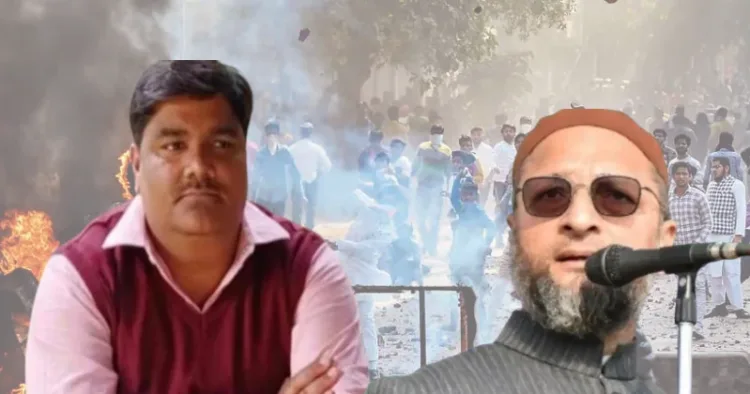The All India Majlis-e-Ittehad-ul-Muslimeen (AIMIM), led by Asaduddin Owaisi, has triggered a political storm by announcing Tahir Hussain, a former AAP councillor and key accused in the 2020 Delhi riots, as its candidate from the Mustafabad Assembly constituency for the upcoming Delhi elections.
Hussain, currently in jail and expelled from the Aam Aadmi Party (AAP) after being implicated in the riots, has been a polarizing figure. Owaisi confirmed Hussain’s candidature, stating, “MCD Councillor Tahir Hussain joined AIMIM and will be our candidate from Mustafabad Assembly Constituency. His family members and supporters met with me today and joined the party.”
Tahir Hussain’s alleged role in the 2020 Delhi riots continues to cast a long shadow. The riots, which erupted in northeast Delhi amid protests over the Citizenship Amendment Act (CAA), claimed 53 lives and injured over 700 people. Hussain was accused of orchestrating violence, including the murder of Intelligence Bureau staffer Ankit Sharma. His house was reportedly used to store stones and petrol bombs, which were later hurled at communities during the riots.
Recently, the Delhi High Court quashed one of the FIRs against Hussain, noting that it overlapped with another case. However, the court clarified that the chargesheet from the quashed FIR would supplement the original case. Despite the reprieve, Hussain remains embroiled in other legal proceedings related to the riots.
The AIMIM’s decision has drawn sharp criticism, particularly from the Bharatiya Janata Party (BJP). Kapil Mishra, a BJP leader, lashed out at Owaisi, saying, “Owaisi has aligned himself with the man responsible for the murder of Ankit Sharma, whose house was found with bombs and stones, and who attempted to kill hundreds of Hindus in Delhi. If another riot happens in Delhi under Tahir Hussain’s name, the consequences will be remembered for generations.”
Mishra’s comments reflect the outrage among certain sections of society, who view Hussain’s candidature as a provocation and an affront to the victims of the riots.
The deadly riots that erupted in Delhi on February 24 and 25, 2020, were the culmination of months of growing hostility and violence fueled by anti-CAA protests, particularly by Islamist groups in Shaheen Bagh and other areas. Violence broke out in northeast Delhi—specifically in Shahdara, Maujpur, Bhajanpura, Brahmapuri, and surrounding neighborhoods—resulting in the deaths of 53 individuals and leaving over 200 others injured.
While many view the Delhi Riots as an isolated incident, a deeper look at the sequence of events beginning with the December 2019 anti-CAA protests reveals a more disturbing narrative. The violence was not an anti-Muslim pogrom, but rather a well-coordinated effort to push India towards chaos, with Hindus bearing the brunt of the attack.



















Comments